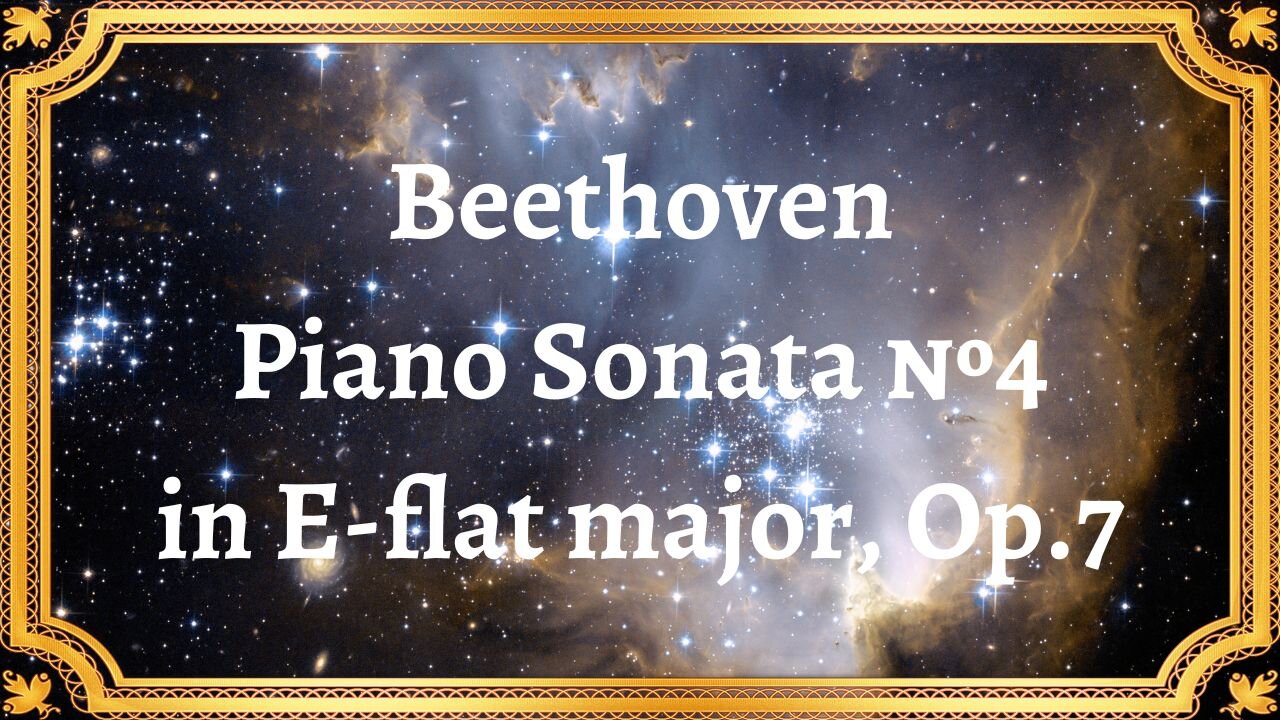Premium Only Content

Beethoven Piano Sonata №4 in E-flat major, Op.7
#Beethoven #Piano_Sonata #classical_music
Beethoven's Piano Sonata No. 4 in E-flat major, Op. 7, is a remarkable composition that showcases the genius of one of the greatest composers in history. This captivating piece encompasses Beethoven's unique style, combining emotional depth, technical virtuosity, and masterful storytelling.
Composed in 1796-97 during the early phase of Beethoven's career, the Piano Sonata No. 4 represents a transitional period between the classical style of Mozart and Haydn and the distinctive, groundbreaking compositions that would later define Beethoven's oeuvre. This sonata reflects Beethoven's ambition to push the boundaries of the traditional sonata form and establish his musical voice as a trailblazer.
Beethoven's Op. 7 consists of four movements: Allegro molto e con brio (fast and with brilliance), Largo, Allegro, and Rondo. The first movement introduces the listener to the grandeur of the E-flat major key, characterized by its regal and majestic qualities. The second movement, Largo, provides a stark contrast, offering a serene and introspective atmosphere. The third movement, Allegro, reintroduces energy and vigor with its lively and rhythmic motifs. Finally, the Rondo movement concludes the sonata with a lively and joyful theme, showcasing Beethoven's mastery of creating memorable melodies.
One of the notable features of Beethoven's Op. 7 is the extensive use of thematic development, where Beethoven ingeniously transforms and expands upon his musical ideas throughout the sonata. This technique adds depth and complexity to the composition, allowing for a richer and more engaging listening experience. Moreover, Beethoven incorporates daring harmonic progressions and dynamic contrasts, further intensifying the emotional impact of the piece.
The emotional range of Beethoven's Op. 7 is vast, ranging from moments of profound introspection to bursts of triumphant exuberance. Beethoven's ability to evoke a wide array of emotions through his music is a testament to his mastery as a composer. Listeners are taken on a transformative journey, experiencing the full spectrum of human emotions, from melancholy to joy, from contemplation to celebration.
The Piano Sonata No. 4 in E-flat major, Op. 7, serves as a testament to Beethoven's innovation and artistry. Its influence can be heard in the works of later composers, who were inspired by Beethoven's groundbreaking approach to composition. The Op. 7 sonata stands as a pivotal work in Beethoven's repertoire, marking his evolution as a composer and foreshadowing the revolutionary pieces that were yet to come.
Beethoven's Piano Sonata No. 4 in E-flat major, Op. 7, is a masterpiece that embodies the brilliance of his musical genius. With its rich musical structure, thematic development, and emotional resonance, this sonata captivates listeners and leaves an indelible mark on the classical music landscape. By understanding and appreciating the historical context, musical structure, and notable features of Beethoven's Op. 7, we gain deeper insight into the magnitude of his contribution to the world of music.
-
 2:30:14
2:30:14
PandaSub2000
4 hours agoCHAOS & FURY | Episode 27: Attack Of The Cranks (Edited Replay)
37 -
 LIVE
LIVE
Spartan
1 hour agoSpartan - Pro Halo Player for OMiT | Ranked for a little bit
11 watching -
 15:15
15:15
Adam Does Movies
1 day ago $0.15 earnedHappy Gilmore 2 - Movie Review
12K14 -
 3:10:16
3:10:16
Toolman Tim
3 hours agoDOOM: The Dark Ages ALMOST DONE! | The Gaming Thinktank
1.5K -
 LIVE
LIVE
SkrimpNGritZ
2 hours agoSkrimpNGritz Off the Grid Live
57 watching -
 16:29
16:29
Mrgunsngear
1 day ago $0.72 earnedGirsan Witness 2311 Match X - Staccato XC On A Budget But Does It Work?
10.9K4 -
 14:54
14:54
Tundra Tactical
3 hours agoTundy's SIG MEME Review 2: The Reload!!!
9.61K1 -
 LIVE
LIVE
Baked Linguini's Home Channel
2 hours agoSpace Marines Co-Op Action
12 watching -

YoungStreetz
5 hours agoStreetz Lazy Sundazy | GDZoG
355 -
 26:54
26:54
Eat Sleep Cruise
2 days agoWe Tested The 10 Best Cruises for Couples - Here's How They Rank!
8.41K3